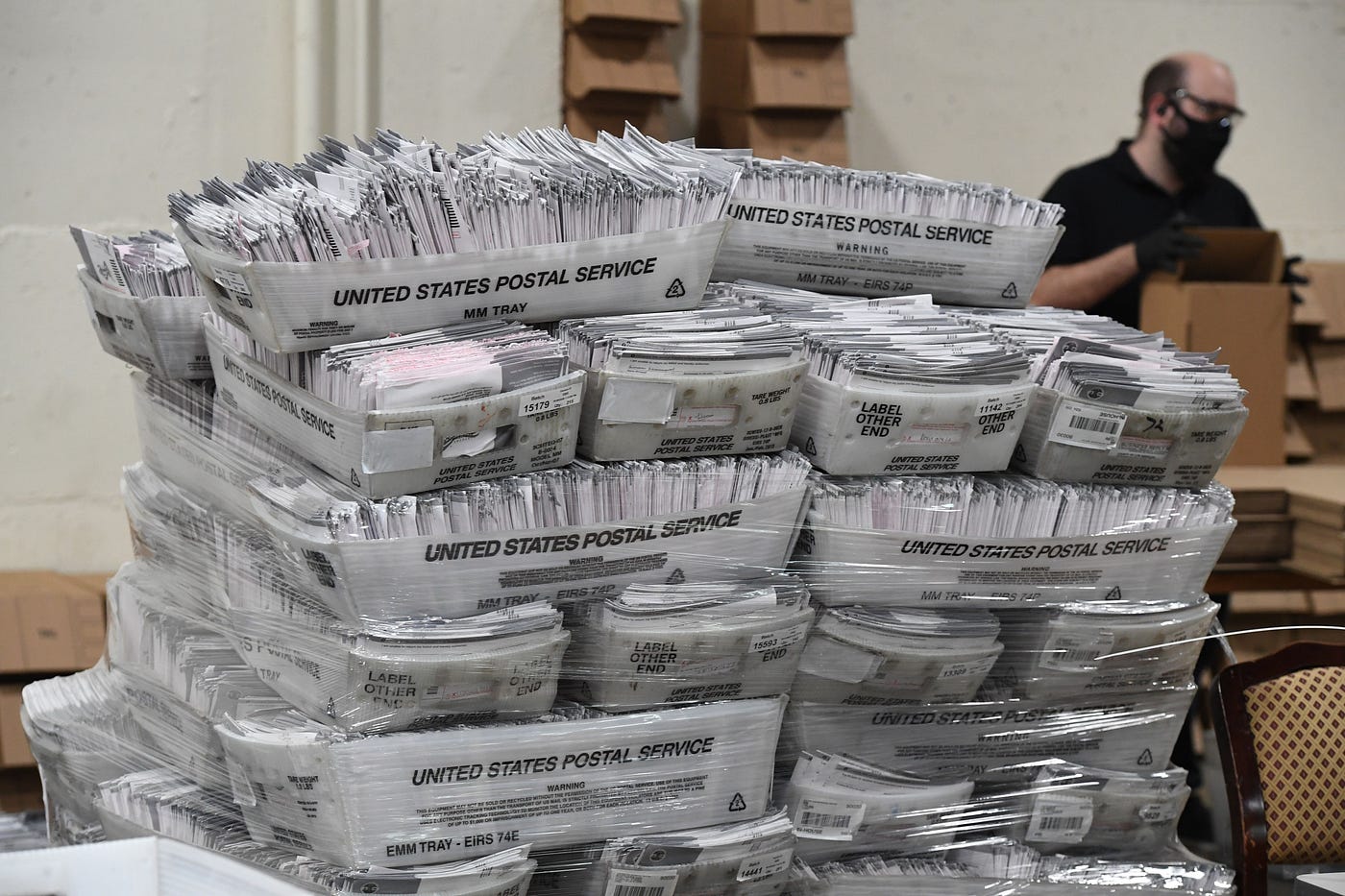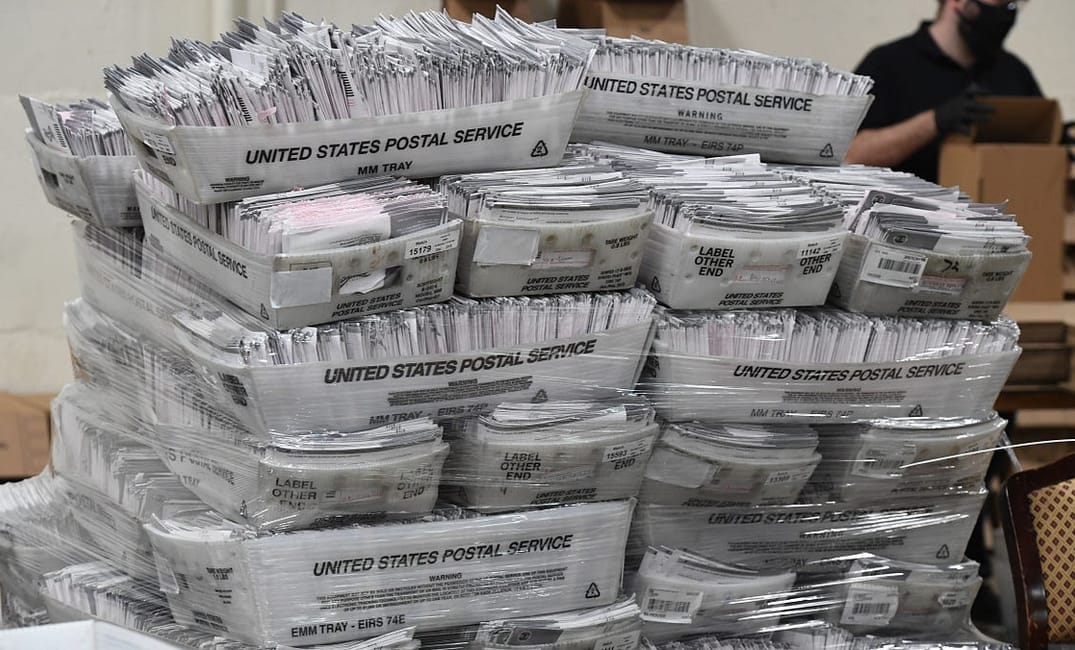
San Francisco philanthropist Uli Schmid-Maybach was planning on voting as always this year — until he talked to his wife, Danielle. She implored him to see this year as different.
“I would normally be fine dropping it in the mailbox,” Uli told me on the phone earlier this week. “I deferred to her insistence on dropping it off at City Hall. You want a certainty that your vote is going to count.”
The Schmid-Maybachs are part of an unprecedented wave of early voting — in San Francisco, in California, and all over the United States — that has fundamentally shifted how political experts see Election Day playing out. As of Friday, more than 9.1 million votes had already been cast in California, 62.7% of the total votes cast in the state in 2016, according to the authoritative tally compiled by the Elect Project.
Sign up for The Bold Italic newsletter to get the best of the Bay Area in your inbox every week.
“Trump has these ideas about cheating,” said Danielle, a political consultant who also owns a skin care company. “Let’s face it, that’s his M.O. That’s made people want to protect their right to vote and make sure they’re counted. In earlier years, you didn’t have to second-guess and worry your vote wouldn’t be counted. This year people really are worried. That’s why I’m fastidious about dropping it off at City Hall because it gets counted earlier.”
Nationally, with Covid helping drive early voting, an astonishing 80.7 million votes had come in by Friday morning, 61.4% of the total votes cast in 2016. In Texas, for example, a state that is too close to call at this point, early voting had already exceeded the 2016 total, and numerous states, including closely watched battlegrounds like Florida and Arizona, had already exceeded 80% of the total vote four years earlier. For many, avoiding the shock of four years ago is a high priority.
“In 2016, 95 million Americans woke up the day after the election, horrified that they didn’t vote,” former Virginia Governor Terry McAuliffe, also a former DNC Chairman, told me on the phone this week. “They didn’t think it mattered. That’s why people have been coming out in record numbers this year, and getting votes in early. Trump’s strategy from the start was to get in-person votes, so he could declare victory on Election night and say those 100 million mail-in ballots are faulty. It’s not going to work. Too many people are voting early.”
This year for the first time, every registered voter in California was sent a mail-in ballot. “We have been strongly urging voters to consider voting early, and so far Californians are responding,” Sam Mahood of the California Secretary of State’s office told the San Francisco Chronicle. “Californians have been returning their ballots in record numbers.”
One important innovation, compared to years past, has been an easy way for voters to sign up to receive a text confirmation when their vote is received. I signed up — and received an actual text notification. Every time I’ve voted before, I always wondered: Was it really counted? This year, I had a text setting me at ease. I’ve written about technology enabling democracy all over the world, but here in my home state, my connection to democracy suddenly feels far more tangible, far less abstract. It turns out to be a really good feeling. That’s how a lot of people are feeling, suddenly much more excited about the idea of their votes mattering.
“This is a different election — it’s something that everybody is talking about,” Gian-Paolo Veronese, grandson of former San Francisco Mayor Joseph Alioto and vice president for corporate development at Truth Enterprises, told me by phone this week. “There hasn’t been one person I’ve talked to who doesn’t plan to vote. You have younger people who would have never voted and they’ve already voted early.”
Something important, potentially epic, is unfolding. Given the vagaries of the Electoral College system, we in California have for years felt that our individual votes don’t even matter. We’re a deep blue state. Democrats win by millions of votes here. But this year’s record-setting surge has given our votes a newfound jolt of relevance: As McAuliffe said, the national vote totals are sending a message, and that message might dissuade attempts to muddy the waters.
As a recent Washington Post headline put it: “Police brace for potential Election Day unrest in a year when ‘everything is uncertain.’”
A clear and powerful electoral verdict is the best antidote to the various fevered scenarios we have to worry about.
“For months, the president has been warning that he might not concede the election in November if he loses,” Lizzie Widdicombe wrote in a recent New Yorker piece, “telling reporters who asked him to commit to a peaceful transfer of power, ‘There won’t be a transfer, frankly. There’ll be a continuation.’” The headline on her article? “What Can You Do If Trump Stages a Coup?”
Vote: That’s the single most important thing to do to help prevent a possible coup. Vote, and vote early, and encourage people you know. Badger them, ask them if they need any help with logistics, want to discuss low-on-the-ballot topics that need figuring out, whatever it takes.
“It’s everything,” Bridget Quinn, author of She Votes: How U.S. Women Won Suffrage, told me. “The main reason to me is because of voter suppression. It’s a way to get around voter suppression. I voted the day after I got my ballot. I have voted absentee since my kids were little. I did an event with Gloria Steinem earlier this year, via Zoom, and she said it is so important that parents take their kids to the polls, and show them how to vote, and show them what it means to be an engaged citizen. So I went to the post office at Geary and Parker with my daughter.”
Doug Sovern of KCBS told me he sees the surge in voting as a “huge story” with consequences. “People want to make sure their votes counted because they’re suspicious about what will happen,” he told me. “Will it go to the Supreme Court? Will the vote be shut down? My wife said, ‘Honey, I don’t want you to wait and drop it off on Election night, I want you to drive it down today.’ People want that margin to be as great as it can be to send a message to Trump.”
Reporting this story, my most memorable call was with Hala Hijazi, a former special assistant to San Francisco Mayor Willie Brown. She was born in Amman, Jordan, and as a naturalized U.S. citizen, voting for her carries reverent importance. “I have a ritual, as an immigrant, I love, love voting,” she said, her voice catching. “I’m trying to hold back tears. It’s — I’m sorry to get emotional. I was phone-banking the other day. I was on the phone with a middle-aged white man and he said, ‘I’m sorry, nobody cares about me, I’m never going to vote again.’ That broke my heart. It’s an honor to me to vote, it’s about patriotism, I’ve worked so hard to be a citizen.”
The early votes have trended Democratic, but enthusiasm also runs high among Trump voters. Still, as Hijazi pointed out, the Biden campaign, with its emphasis on the importance of empathy and listening, has made important inroads.
“The campaign has really spoken to Middle America, places like the Central Valley, places like Redding,” she said. “People forgot blue-collar workers. That’s why police and firefighters voted overwhelmingly for Trump. They’d voted twice for Obama. This election is special. You’re seeing an overwhelming response because people feel like someone is listening to them. They are being heard. The Democratic Party needs to make sure they’re not only focusing on identity politics, but also on our brothers and sister in Middle America.”







